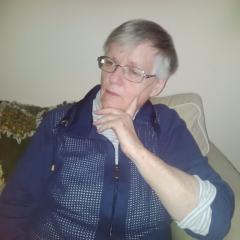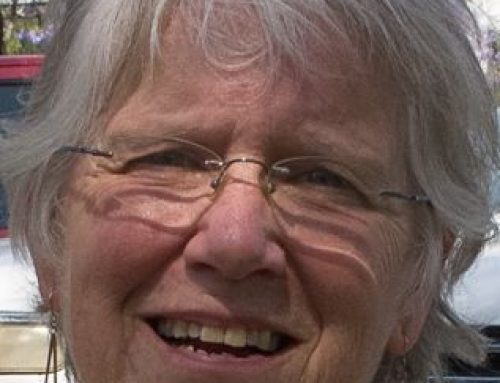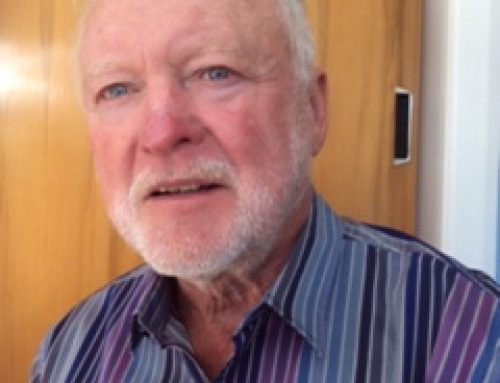There is a moment between sleep and wakefulness when anything is possible. You know in that fraction of a second, before your brain clicks into gear, that you are flying or dancing with the stars, or that you are alone in a dark cavern. It’s a fragment of time when the impossible and the implausible might frighten or amuse, but don’t strike you as odd.
So it was when I touched the hand beside mine and thought with a joy I hadn’t felt for months, this is my husband’s hand.
Daylight cracked the night then, and I remembered with a sharp clarity that I had no husband, that the man I once called husband had left me, and that the hand I touched now was that of a stranger. I raised myself on my elbow and looked at him. He was so still I thought at first he might be dead, and then I saw the slightest flutter of his lips, a barely discernible widening and narrowing of his nostrils as he breathed.
What was I to do with a reality like this? At some point, he would wake and ask me questions. Where was he. Who was I. I would have questions of my own too, but for now, in this moment, I wanted to hold the dream that he was mine, that the air between us, with its trace of ice and salt, was ours.
I lay beside him for a few minutes, taking stock of what lay ahead and the fact that he would not sleep forever. Then I slid from the bed and stood on the cold boards before the mirror. I so rarely look at my body any more and my nakedness startled me. My nipples were erect within the brown areolas of heavy breasts, and my stomach was puckered and dimpled. My hair which had once been red—stunningly alight, my husband used to call it—was now fading to grey, and my face bore the furrows of middle age. I looked at the man who slept in my bed, and I was hurt by his youth. I dressed quickly.
*****
He had arrived well past midnight when I was in the middle of dreams. The knocking on my door had woken me and I had gone, drunk with sleep, to let him in.
Foolish, perhaps, in the normal course of things, but we were caught in a storm that had driven in from the west and then stalled, dumping over three feet of snow that cut power and made the roads impassable. And there at my door, under the yellow glare of my flashlight, was a man who looked as close to death as anyone I had ever seen.
He staggered against me and fell into the hallway. I closed the door against the wind and snow and helped him stand, and felt the hardness of his arm beneath my fingers. Ice fell from his body as I led him to my kitchen. I pulled off his coat—a sodden thing heavy with snow—and placed him in a chair, then struggled to take off his boots which were as soaked inside as out. I poured some brandy into a small glass and encouraged him to swallow. He slumped forward in the chair and whispered something I couldn’t catch. His eyes closed.
“No, you mustn’t sleep,” I said, sure that if he did, he wouldn’t wake. I touched his cheek and felt the waxiness of frostbite, and I knew that if I didn’t warm him soon and quickly, he could die there in my kitchen.
“Come,” I said, “I’ll help you, but you have to help me too.” I half carried, half dragged him to my bedroom and propped the flashlight on the dresser. I stripped off his clothes and dried him gently with a towel while spasms shook his body, and he groaned through chattering teeth as I helped him to the bed and covered him with blankets. It would take more than blankets to warm him, so I did the only thing I could with the storm raging outside. I took off my thick nightgown and lay beside him, and wrapped my warm body around his as I urged him not to sleep.
Long after the light from my flashlight had died, his shivering stopped and his breathing became regular and deep; and with my cheek against his shoulder, I felt his skin begin to warm. Curled around his back, I slept too, and dreamed that my husband had returned, that this was my husband’s back against my breasts.
*****
Now, I stood beside the bed and watched him sleep. I memorized the shape of his face, and when I thought I knew him, I picked his wet clothes from the floor. I felt for a wallet— something to tell me his name—but the pockets were empty so I took the clothes to the kitchen and hung them over chair backs to dry. The power was still off and it could be days before the linesmen reached me, but I had an old camp stove for emergencies; and I heated some water and threw in some instant coffee, and shared the concoction between two mugs.
I heard a sound behind me and turned. He was leaning against the door, holding a blanket around his body. “I’m sorry,” he said, and his voice was rough, as if his throat were filled with a hundred tiny pebbles.
“I’ve made coffee,” I said and held the mug out to him.
He shuffled to the nearest chair and struggled with the blanket, keeping it around him while freeing one hand from its folds. “Thank you.” He took the mug and sipped the coffee. I heard him swallow.
“You could have died last night,” I said. The skin on his face was chapped and red, and the mug shook in his hand, but otherwise, he seemed to have escaped the worst ravages of frostbite.
“My car ran off the road.”
“It’s over a mile to the highway. I’m surprised you found your way here.”
He didn’t ask my name or tell me his, but said, “Can I use your phone? I need to call my wife. She’ll be worrying.”
So he had a wife. “The lines are down,” I said, “and I’m afraid the battery on my cell phone is dead. But let me make you something to eat. You must be hungry.” His wife could wait, and I would take care of her husband.
I cracked two eggs and scrambled them over the little stove, and served them to him with buttered bread. Then would have been the time to ask his name and how he found my house in the dark, but instead I said, “Let me find you some clothes.” I left him sitting there and went to my bedroom.
Some of my husband’s clothes still hung in the closet—three shirts that I had given him, a jacket (favourite of mine), and the suit he wore when he married me. A year ago, when he left, I’d been tempted to throw them out or burn them, but to do so meant surrendering to my loss completely. So I’d kept them, burying my face in the smell of him on nights when I couldn’t sleep, or on days when I couldn’t think.
I took the jacket from its hanger, but almost immediately I put it back, loathe to share what little I had left of him. I moved to my side of the closet. I am tall for a woman, and it didn’t take long to find a thick sweater and a pair of sweat pants that had stretched even outside my own proportions. I took them to the kitchen, along with a pair of socks, and placed them on the chair beside him. “These might be more comfortable than draping yourself in a blanket,” I said, “if you don’t mind wearing purple.”
He had barely touched the food on his plate. “What am I going to do?” he asked.
“I’m afraid you’re stuck here until the snowplows clear the roads.”
“Maybe I can walk back to the highway.”
“Your clothes are soaked, and you’ll freeze to death without a coat. So eat now, and get dressed. I’ll be back in a while and we can figure out what to do.”
I walked down the hall to my study and closed the door and sat for ten minutes or so before the pile of term papers on my desk. I had planned to finish marking them today, but now that I had a guest, they could wait.
When I returned to the kitchen, he was already dressed and standing awkwardly against the table. “Does it suit me?” he asked. “This colour?” He was trying to make light of his predicament, I think, to shrug off the discomfort of wearing my clothes.
“You look very handsome,” I said, and meant it. My husband had liked me in purple too, once upon a time.
“Do you have a neighbour I could reach? Someone who might have a phone?”
If I had a close neighbour, I would have told him. I would have offered to go for help myself, but my closest neighbour was on the other side of the highway, a good three miles away. “We could try smoke signals,” I said, but he ignored my attempt at levity and sat down with his head in his hands. I noticed the way his hair curled at the nape of his neck, and I wanted to touch it, to feel it spring beneath my fingers.
“I really need to get a hold of her,” he said. “My wife. She’ll be frantic.” He rubbed his right thumb over his left hand, and I saw he wore no ring.
“Why on earth were you out in this weather?” I asked. “They were warning people not to use the roads.”
“We had an argument.”
“And you walked out?”
He nodded. “Just to calm down. I had no intention of staying out for long.”
“Was it a serious argument?”
He appeared to consider my question for a moment, and made a sound that could have been either assent or dissent.
“I’m sorry, it’s none of my business,” I said.
He looked up then as if he were seeing me differently, as if I were a friend perhaps, or an older relative who could comfort him. “We were arguing because I accused her of cheating on me.”
“And is she?”
“That’s the thing. She says she isn’t, but I don’t know. I want to believe her, I really do.”
“But?”
“We’ve only been married four months.”
“There must have been something that made you suspicious. Or are you just the jealous type?” I know what jealousy is, of the damage it causes.
“There are phone calls, and she takes them in the bedroom and says it’s her mother or her sister. And there’s all these men at school, and I worry that she’ll meet someone smarter or better or …” His voice trailed off as if he felt embarrassed at sharing so much information with a stranger.
“Your wife goes to school?”
“Yes. At Camden.”
My university. I almost said so out loud. “What courses is she taking?”
“Humanities. English, philosophy, medieval history. I’m not sure what else.”
Not that anything else mattered. Medieval history is mine. It’s a small class, with a reputation for tedium. I know the names of all my students. So why didn’t I take this opportunity to ask her name, tell him that I must know her? Perhaps it was because, until that moment, his wife had been unsubstantiated, someone I could pretend existed only in his imagination.
“Are you a student too?”
“No, I was never smart enough to go to university. I work for my father. Construction.”
I looked at his hands again. They seemed too gentle to wield a hammer, to use a saw, to build a house. They were the hands of a thinker or a poet. The hands of a lover. My husband’s hands.
“I think you need to rest,” I said. “And you need to stay warm. There’s nothing we can do until the snowplows get through. There’s my bedroom, or you can go into the living room. There are magazines there, and books. I have some work to do, but it won’t take me long.”
He asked, then, how far we were from the main road and when I thought the snowplows would reach us. I could have given him hope, told him that the snowplows were already on the highway and would probably be at my lane by nightfall—I had caught a flash of distant blue on the underside of cloud, the slow progression of heavy machines. I put my hand on his arm and felt hard muscle and flesh beneath my fingers. “It could be tomorrow,” I said.
Back in my study, I began to go through the student papers on my desk, putting faces to names, trying to picture if this girl or that would be married to the man in my house. Most I discarded as being too plain or too empty headed. And then I picked up Lisa Lindt’s paper and saw her clearly: a dark-haired gamin with huge, brown eyes, and one of the brightest students in my class. Brains and beauty, the sort of girl any man would fall for. I thought of the boy who sat beside her: a tall, uncomfortable youth who didn’t take my course seriously. He whispered things to her that made her smile, and only last week had put an arm around her and pulled her close while I watched, and kissed her when she turned her face to his.
Should I have left my study then, shown my visitor her paper and asked, is this your wife? Could I have mentioned Martin Killen, the boy who sat beside her. Would I have told him, yes, I think your wife is cheating.
I fingered Lisa Lindt’s paper, and smelled a faint perfume like oranges. I remembered that scent now. She’d approached me two or three weeks ago and asked for special dispensation on her upcoming midterm. Was there an emergency, I asked her. No, she said, but she needed to be out of town. Martin Killen stood a few paces behind her, moving his weight from foot to foot, impatient to leave.
“I’m sorry, Miss Lindt,” I said, “but I can’t give you dispensation except in the case of illness or family emergency.”
She rolled her eyes and turned to the boy with a shake of her head. They left, and the smell of oranges lingered for a while, then dissipated as other students came to talk to me.
I pushed her paper to the bottom of the pile and returned to the living room. He was sitting on the couch, hugging my purple sweater around his body.
“Do you have a car?” he asked without looking at me.
“It’s round the back. Stuck there until I can get the snow blower out and clear the driveway. But even then we’ll have to wait until the plows have been.”
“I don’t know what to do.” He looked so forlorn that I wanted to go to him and put my arms around him and comfort him.
“Your wife will survive,” I said, sure of it.
“Perhaps I can clear the driveway for you?”
“Not yet,” I said. “Besides, your coat and boots are still wet. Wait until this evening, at least.”
It’s odd, perhaps, that I still didn’t ask his name, or he mine, but the time for that had passed. Now we were quiet, and he picked up a magazine from the coffee table and thumbed fast through the pages as if his actions could hurry time. I went to the window and watched for glimpses of reflected light from the working plows. They were still hours from my lane.
Finally I broke the silence. “Are you thirsty? I have some fruit juice or I can make more coffee.”
“No.” Then, “Thank you,” as if he suddenly remembered his manners.
“Try to relax. And be patient. The plows will be here eventually.”
I left him with the magazine and a blanket around his shoulders, and went back to my study. I tried to mark papers but my mind wasn’t on them. Instead, I thought of my husband and his betrayal. I thought of Lisa Lindt and Martin Killen, and of the man whose body I had cradled in the night. Finally, I forced myself back to the term papers and finished them all except for one. Miss Lindt’s paper could wait until tomorrow, until I could decide what to do with it.
He was sleeping when I returned to the living room, the open magazine across his chest. I removed it slowly so as not to wake him, then went to the kitchen to see what I could cook up. I hoped that the gas in my little stove would last for at least one more day.
I cleared the table of the morning’s unwashed plates and mugs, and replaced them with fresh silverware and a clean white cloth. And I found two linen napkins and folded them into swans. There was beer and wine and brandy in my pantry, and I selected a bottle of Pinot Noir and dusted off two wine glasses and set them on the table, along with a slab of butter and slices of bread. Then I opened two cans of soup and heated them on the stove.
I touched his face to wake him, and invited him to join me in the kitchen. “It’s dark early,” I said, “so let’s eat while we can still see.” Outside, the underbelly of heavy clouds caught and held the lights from the snowplow. It was already at the start of my lane and would be here in less than half an hour.
I pulled down the blinds and gave him the chair with its back towards the window. He sat down and his elbow knocked his napkin to the floor, where it unfolded. He tried to restore the swan, but when he had finished, it looked more like a turtle.
I laughed. “I thought you worked in construction.”
“Give me some wood and a hammer and nails, and I’ll build you a boat,” he said. “I’m just not good with birds. Or women, apparently.”
I turned the conversation to other things, making jokes—in spite of my rather sour demeanor, I can be very funny when I try—and had him smiling as I poured the soup between two bowls. I lit candles and placed them in the middle of the table. “Let’s make the most of it.” I poured the wine and lifted my glass in a toast. “To snow and stormy weather,” I said.
He raised his glass but said nothing. His face was contoured in shadow and in the flickering candlelight had lost its youth. He could have been my husband sitting there.
*****
It had been a day much like this, a little earlier in the season, but with snow already falling and promising to block roads and cut us from the highway. We hadn’t spoken much since I returned from work, and he exuded an uneasiness that worried me. Normally we would read the paper together before eating, or share humorous anecdotes about our day. He was a journalist and often had stories to tell but not now. Now he sat silent on the couch, flicking through the channels on the television as if anticipating bad breaking news.
I put a hand on his forehead to feel for a fever. “Are you sick?” I asked.
“No. No. Just tired.”
I kissed the top of his head and told him to relax, and went into the kitchen. I made his favourite dinner: seared scallops with buttered asparagus, and chocolate lava cakes warmed in the oven. I lit candles and poured the wine and called him to join me. He sat opposite me, but couldn’t or wouldn’t look at me.
“I’m sorry,” he said. “I can’t do this anymore.”
“What do you mean? Do what?” The words were someone else’s, the voice that slipped between my lips not mine.
“There’s someone else,” he said. He played with the wedding band on his finger. Candlelight caught its facets so that sparks of light reflected off his face.
I swallowed some wine and felt it burn in my throat. I wouldn’t believe him, and I asked him, teasingly, if she was prettier than me, younger and smarter. He didn’t answer, refused still to look at me.
As the truth settled around us, I asked him if he was in love with her.
“Very much,” he said. And quietly, “I have to be with her.”
I reached across the table and gripped his hands. “You need to be with me,” I said. “No one else can love you the way I do.”
He pushed my hands away and stood, knocking over his chair. I listened from the kitchen while he went to the bedroom, while the untouched meal grew cold on the table and the candles spluttered and dripped wax on the white cloth. There was the sound of drawers closing, of the closet door swinging on its hinges, of a bag being zippered. He came back to me for the last time and gently wiped the tears from my eyes. “I’m sorry,” he said again.
I have wondered often, if I’d kept him for a few more hours, until the snow blocked his escape, could I have convinced him to stay, or would he have left regardless, taken his bag and walked through the snow until he reached the highway, risking frostbite or worse.
But the roads were still passable, and he took his car while I stood at the window and watched while the snow covered his tracks. I found his wedding band later, tucked behind the jewellery box on my dresser.
*****
Now I looked across the table at a man who was not my husband and hoped he couldn’t see the ache at the corners of my mouth.
“You don’t wear a wedding ring,” I said.
“I threw it at her,” he said. “I shouldn’t have done that. It was stupid.”
“Tell me about her,” I said. “Is she pretty?” Maybe I was wrong and his wife was not Lisa Lindt, but one of the others. Mousy-haired Veronica who sat in the front, timid Julia or coy Eloise—I knew them all and the games they played. This was the time I should have asked his wife’s name. Instead, I said, “Are you in love with her?”
“Yes. Very much.” He was silent for a moment, touching the pale, empty circle on his finger. Then, “Are you married?”
“I was,” I said. “My husband cheated on me.”
“So you understand,” he said. “How much it hurts.”
Was he expecting me to offer him platitudes about love conquering all? Did he hope that I’d encourage him to confront his wife and demand the truth? Somewhere across the country, my husband had made a new life for himself with a woman whose name I refused to say out loud. Should I tell him that?
“Finish your soup while it’s hot,” I said.
I could hear the snowplow now, less than five minutes away. He heard it too, because he twisted in his chair to look behind him at the window. His clothes, strung over the chair backs where I had placed them last night, were still damp; and I wanted to tell him he should wait another day, give his clothes time to dry completely, but he was impatient and pushed himself away from the table. He took his shirt and jeans and held them against him, against my purple sweater.
He looked at me with gratitude and relief and said, “I don’t even know your name.”
The plow’s lights shot arcs of blue through a gap in the blind, and I picked up my glass and drank my wine.
March 2015

 Helen Rossiter lives in Ottawa, Canada. Fiction awards include winner of the Alice Munro Festival Short Story contest and winner of the Canadian Authors Association (NCR) short story contest. Her fiction has appeared in On The Premises, The Furious Gazelle, Avatar Review, and others.
Helen Rossiter lives in Ottawa, Canada. Fiction awards include winner of the Alice Munro Festival Short Story contest and winner of the Canadian Authors Association (NCR) short story contest. Her fiction has appeared in On The Premises, The Furious Gazelle, Avatar Review, and others.



